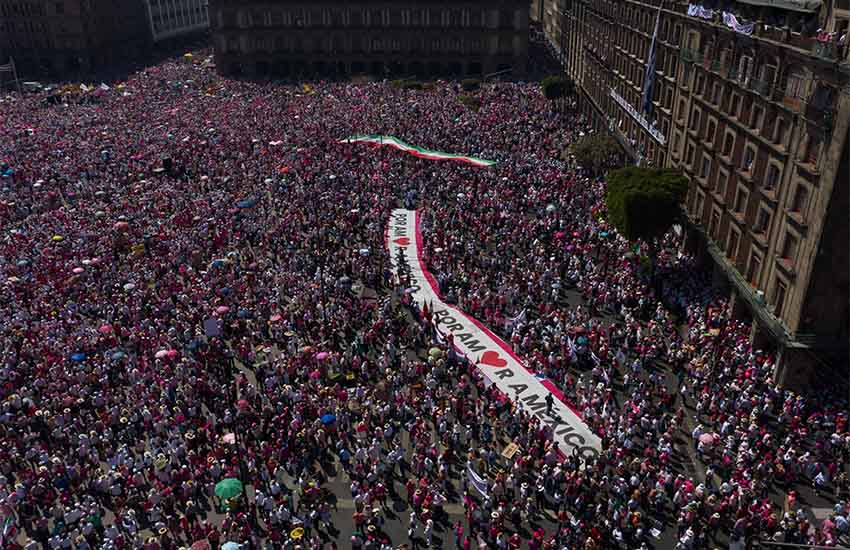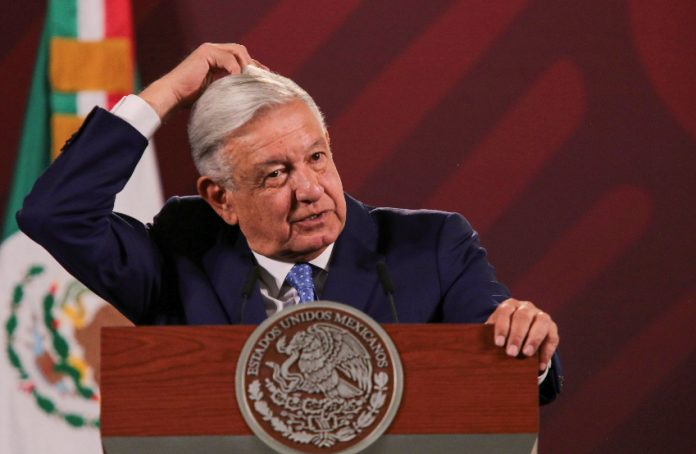A majority of Mexicans continue to approve of Andrés Manuel López Obrador’s performance as president, a new poll found, but the percentage of those who disapprove has hit a new high.
The results of the latest El Financiero survey show that López Obrador had an approval rating of 54% in February, a result that mirrored the finding of the newspaper’s January poll.

The percentage of respondents who disapprove of the president’s performance increased one point to 46%, the highest figure since López Obrador took office in December 2018.
A total of 1,100 Mexican adults across all 32 federal entities responded to El Financiero’s poll, conducted via telephone on Feb. 10, 11, 24 and 25. The federal government’s controversial “Plan B” electoral reform package passed the Senate on Feb. 22.
López Obrador retained the support of a majority of poll respondents even though most of them rated his government poorly in the key areas of economy and public security.
Only 34% of those polled praised the government’s management of the economy while just 27% assessed it positively for its security efforts. In contrast, 51% of respondents rated the government’s economic performance as poor or very poor and 59% said the same about its security strategy.

Mexico’s economy grew 3.1% in 2022, while the number of murder victims – a key marker of the security situation – once again exceeded 30,000.
Although López Obrador has made combating corruption a central aim of his administration, only 35% of respondents said that the government is doing a good job in the area. A considerably larger cohort – 45% of those polled – were critical of the government’s efforts, or lack thereof, to combat corruption.
The AMLO administration was assessed more favorably for its provision of welfare and public health services. Almost half of respondents – 48% – spoke approvingly of the government’s social support measures compared to 31% who criticized them, while 47% of those polled praised its public health services compared to 36% who thought they were bad or very bad.
López Obrador has highlighted that 25 million households benefit from the government’s welfare programs, and said last week that authorities are on track to establish a universal health care system comparable to that in Denmark.
Asked whether Mexico is generally on a good or bad path under the president’s leadership, 33% of respondents said the former while 35% said the latter.
The percentage of those who believe Mexico is on a good path declined five points in the space of a month, but El Financiero’s poll results didn’t clearly suggest why.
One plausible reason is the presentation and ultimate approval of the government’s electoral reform package, which has been widely criticized for weakening the National Electoral Institute.
Hundreds of thousands of Mexicans protested the legislation in cities across the country on Feb. 26.
El Financiero’s survey also found strong support for Morena, the political party founded by López Obrador. Asked who they would vote for if presidential elections were being held on the day they were polled, 45% of respondents opted for the ruling party.

Only 18% chose the National Action Party (PAN), 14% nominated the Institutional Revolutionary Party (PRI), 9% mentioned the Citizens Movement party and 5% expressed support for the Democratic Revolution Party (PRD).
Total support for Morena and its allies, the Labor Party and the Ecological Green Party of Mexico, was 50% while backing for the PAN-PRI-PRD alliance added up to 37%.
The “Va por México” opposition alliance announced in January that it would field a common candidate at the presidential election in June 2024.
Mexico City Mayor Claudia Sheinbaum and Foreign Affairs Minister Marcelo Ebrard are seen as the leading contenders to secure Morena’s nomination.
There is far less clarity about who will represent the PAN, PRI and PRD. In that context, President López Obrador offered his own (very) long-list of possible opposition candidates last October, saying that a total of 43 people had either expressed interest in vying for the presidency or had been mentioned as potential contenders.
With reports from El Financiero
